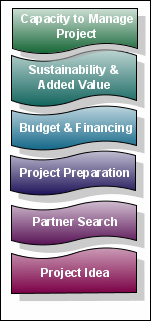Project Proposal Preparation
 |
Cross-Border ProjectsCross-border projects under IPA CBC programmes imply that project partners from two participating countries need to cooperate in at least one of the following ways: 1. joint development Project IdeaA successful project preparation process starts with a well-formulated project idea that has to be linked to the programme’s prirorities and measures covered by the ongoing Call for Proposals under which it will apply for funding. In order to do this, make sure you get acquainted with the content of the cross-border programme(s) you are eligible for even before the Calls for Proposals are published. You can do this by visiting the Programme Websites, if they exist, or the websites of the institutions/bodies responsible for programme management in your country – National IPA CBC Coordinators (check our section on Useful Links). |
Finding a Partner
Whether you define the project idea and then look for a partner, or use the already well-established and tested relations with an eligible institution and jointly develop a project idea of common interest, you must have a partner from across the border.
The partnership must be based on clear ides and perceptions about the project, where each partner has a well-defined role and project activities and benefits shared in a balanced way.
There are several ways to go about finding a partner:
- your own contacts
- Partner Search Forums
- CBIB Partner Search application
- other organizations.
There are minimum rules that you find explained in the Guidelines for Applicants, but there is no upper limit to the number of members the partnership may have. However, there is no point adding partners just for the sake of it – bear in mind that the more partners are involved, the more complex and difficult managing the project will become!
For more information, check our presentation on Partnership principles.
Process of Project Proposal Preparation
In order to prepare a successful project proposal in accordance with the EU standards, you have to be familiar with the principles of Project Cycle Management (PCM) and the Logical Framework Approach (LFA), as this is the accepted project preparation methodology.
Preparing a project proposal according to the LFA means starting with the initial idea, finding suitable partners, conducting a set of analyses with your partner which will lead to setting objectives, results and activities, developing the logframe and from there developing details of the project proposal and filling in the needed forms and templates.
It is crucial that you make a thorough analysis of the background of your project where you define essential problem areas, target groups and stakeholders, as well as links and complementarities with other initiatives. This is why it is strongly recommended that you start the preparation of your proposal from the Logical Framework as it will help you structure your ideas and check their logic.
When preparing a project, you also need to make sure that your activities are realistically planned in terms of time and money necessary for their implementation, which means that preparing an adequate Work Plan and budget is of key importance for the success of your proposal.
Once you have prepared the Logframe Matrix, the Work Plan and the Budget, you can start to translate your project into the Application Forms and other templates required in the Guidelines for Applicants. You need to strictly respect the rules as explained in the GfA. Do not leave out or change any chapters or change their sequence and respect the limitations to a certain number of pages that are indicated for most sessions.
Useful documents such as EC PCM Manual, CBIB Project Preparation Manual, and Manual for Applicants prepared by the JTS for the programme Croatia – Bosnia and Herzegovina, will provide you with necessary explanations regarding the PCM and LFA methodology and main steps.
You will find explanations for the most commonly used terms during project preparation in our glossary.


